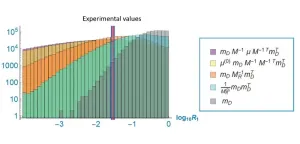(Press-News.org) Obstructive sleep apnea (OSA) is a potentially dangerous condition. During sleep, the throat muscles of people with OSA relax and block the airflow into the lungs, so that they repeatedly stop breathing. Common symptoms of OSA include restless sleep, loud snoring, daytime sleepiness, and prolonged headaches in the morning – highly debilitating for patients and their partners.
OSA is currently underdiagnosed: it may occur in as much as 15 to 30% of men and 10 to 15% of women, or approximately 1bn adults worldwide, of whom an estimated 80% don’t know they have it. Major risk factors for OSA include middle or old age, being obese, smoking, chronic nasal blockage, high blood pressure, and being male.
Now, researchers from the UK, Germany, and Australia have shown for the first time that in middle-aged men, OSA can also cause early cognitive decline, even in patients who are otherwise healthy and not obese. The results are published in Frontiers in Sleep.
“We show poorer executive functioning and visuospatial memory and deficits in vigilance, sustained attention, and psychomotor and impulse control in men with OSA. Most of these deficits had previously been ascribed to co-morbidities,” said Dr Ivana Rosenzweig, a neuropsychiatrist who heads the Sleep and Brain Plasticity Centre at King’s College London, and the lead author of the study.
“We also demonstrated for the first time that OSA can cause significant deficits in social cognition.”
Rare cohort without co-morbidities
Rosenzweig and colleagues studied a group of 27 men between the ages of 35 and 70 with a new diagnosis of mild to severe OSA but without any co-morbidities. Such patients are relatively rare, because most men and women with OSA have co-morbidities such as cardiovascular and metabolic disease, stroke, diabetes, chronic systemic inflammation, or depression.
The men were not currently smokers or alcohol abusers, and were not obese (ie, with a body mass index (BMI) below 30). As a control, the researchers studied a group of seven age-, BMI-, and education-matched men without OSA. The OSA diagnosis was confirmed by a so-called WatchPAT test of their respiratory function during sleep at home, and also by video-polysomnography at King's College sleep center. With the latter method, the brain waves of sleeping subjects were measured by electroencephalography (EEG), while their blood oxygen levels, heart rate, breathing, and eye and leg movements were tracked.
The scientists also tested the subjects’ cognitive function with the CANTAB or ‘Cambridge Neuropsychological Test Automated Battery’ of tests.
Premature cognitive decline
The results showed that patients with severe OSA had poorer vigilance, executive functioning, short-term visual recognition memory, and social and emotion recognition than the matched controls. Patients with mild OSA performed better in these domains than patients with severe OSA, but worse than the controls.
“The most significant deficits…were demonstrated in the tests that assess both simultaneous visual matching ability and short-term visual recognition memory for non-verbalizable patterns, tests of executive functioning and cued attentional set shifting, in vigilance and psychomotor functioning, and lastly, in social cognition and emotion recognition,” wrote the authors.
The authors conclude that OSA is sufficient to cause these cognitive deficits, which previous studies had attributed to the most common co-morbidities of OSA such as systemic hypertension, cardiovascular and metabolic diseases, and type 2 diabetes.
Unclear mechanism
But what is the mechanism by which OSA causes premature cognitive decline? The authors speculated that the cognitive deficits are due to intermittent low oxygen and high carbon dioxide in the blood, changes in blood flow to the brain, sleep fragmentation, and neuroinflammation in OSA patients.
“This complex interplay is still poorly understood, but it’s likely that these lead to widespread neuroanatomical and structural changes in the brain and associated functional cognitive and emotional deficits,” said Rosenzweig.
Whether co-morbidities have similar negative effects on cognition above and beyond those caused directly by OSA is not yet clear.
“Our study is a proof of concept. However, our findings suggest that co-morbidities likely worsen and perpetuate any cognitive deficits caused directly by OSA itself,” said Rosenzweig.
“What remains to be clarified in future studies is whether co-morbidities have an additive or synergistic effect on the latter deficits, and whether there is a difference in brain circuitry in OSA patients with or without co-morbidities.”
END
Obstructive sleep apnea may directly cause early cognitive decline
Obstructive sleep apnea now shown to cause cognitive deficits in middle-aged men, even in the absence of co-morbidities or obesity
2023-04-06
ELSE PRESS RELEASES FROM THIS DATE:
Random matrix theory approaches the mystery of the neutrino mass!
2023-04-06
When any matter is divided into smaller and smaller pieces, eventually all you are left with—when it cannot be divided any further—is a particle. Currently, there are 12 different known elementary particles, which in turn are made up of quarks and leptons each of which come in six different flavors. These flavors are grouped into three generations—each with one charged and one neutral lepton—to form different particles, including the electron, muon, and tau neutrinos. In the Standard Model, the masses of the three generations of neutrinos are represented by a three-by-three ...
Lab-grown fat could give cultured meat real flavor and texture
2023-04-06
Researchers at Tufts University have successfully bulk-produced fat tissue in the lab that has a similar texture and make-up to fat tissue naturally occurring in animals. The results, described in a study published today in eLife, could be applied to the production of cultured meat grown entirely from cells, giving it a more realistic texture and flavor.
Startup companies around the world are developing cultivated meat—cell-grown chicken, beef, pork, and fish. Most are in early stages of development, not ready for large-scale production and, with a ...
Disruption from war in Ukraine pushes highly contagious infectious diseases to alarming levels
2023-04-06
Analysis of official Ukraine health data reveals a perfect storm of rising infectious diseases cases and falling levels of childhood vaccination and case detection in the frontline eastern region of Kharkiv.
Between January and September 2022, new cases of rubella were 23 times higher among children living in the Kharkiv region than average rates across Ukraine, while shigellosis (diarrhoeal disease) and viral meningitis incidence was around 6 times higher, and whooping cough 5 times greater.
But registration of infectious disease cases halved in Kharkiv ...
Air pollution may increase risk for dementia
2023-04-06
Key points:
This meta-analysis, which includes the most recent studies evaluating the link between air pollution and dementia, is the first to include studies based on active case ascertainment and to evaluate studies using a new, more powerful bias assessment tool.
The findings support the public health importance of a proposal, currently under consideration by the Environmental Protection Agency, to strengthen regulations on PM2.5
Boston, MA—Exposure to fine particulate air pollutants (PM2.5) may increase the risk of developing dementia, according to a new meta-analysis from Harvard T.H. Chan School of Public Health.
“This is a big step in providing actionable ...
Exposure to fine particle air pollution linked to heightened dementia risk
2023-04-06
Exposure to fine particulate matter (PM2.5) air pollution is linked to a heightened risk of dementia, even at levels below current US, UK and European air quality standards, finds research published by The BMJ.
More limited data suggests that exposure to nitrogen dioxide and nitrogen oxide might also be a risk factor for dementia.
Many uncertainties remain, so caution is needed when interpreting these findings, but the researchers say the results “strengthen the evidence that air pollutants are risk factors for dementia.”
More than 57 million people worldwide are living with dementia and the global ...
Limit added sugar to six teaspoons a day to improve health, urge experts
2023-04-06
Experts recommend reducing consumption of added (“free”) sugars to around six teaspoons a day and limiting sugar-sweetened drinks to less than one serving a week after a comprehensive evidence review published by The BMJ today.
They found significant harmful associations between sugar consumption and 45 outcomes, including asthma, diabetes, obesity, heart disease, depression, some cancers and death.
It’s widely known that excessive sugar intake can have negative effects on health and this has prompted the World Health Organization (WHO) and others to suggest reducing consumption of free or added sugars ...
Healthy lifestyle associated with reduced mortality risk in childhood cancer survivors
2023-04-06
(MEMPHIS, Tenn. – April 05, 2023) A report from the Childhood Cancer Survivor Study (CCSS) provides strong evidence of the importance of a healthy lifestyle for adults who were treated for cancer as children. The study is the first to find that the specific primary causes of death in long term survivors are many of the same leading causes of death in the U.S. population, often occurring at younger than expected ages. It also found that adult survivors of childhood cancer experience four times the risk of late mortality as the general population, even 40 years after diagnosis. However, ...
Texas Children’s and Baylor College researchers use innovative dual-target deep brain stimulation approach to treat patients with obsessive-compulsive disorder and Tourette Syndrome
2023-04-06
Up to two-thirds of patients with Tourette syndrome (TS), a tic disorder characterized by sudden uncontrollable physical movements, also suffer from obsessive-compulsive disorder (OCD), a psychiatric condition characterized by intrusive thoughts and repetitive behaviors. Unfortunately, many of these dual-diagnosis patients are resistant to conventional treatments such as medications or behavioral therapy. While deep brain stimulation (DBS) has been approved for compassionate use by the U.S. Food and Drug Administration for OCD, this promising procedure is under investigational use for ...
USC study: Disruptions in exports of grains from Ukraine and Russia cost the world’s economy more than $1.6 billion during the first year of war
2023-04-06
Russia’s invasion of Ukraine has struck a major blow to global markets for vital commodities – particularly grains like wheat and maize. Shortages and price increases are contributing to the food insecurity crisis in certain parts of the world, according to the United Nations, and to more general economic uncertainty.
A new study led by Adam Rose, research professor at the USC Sol Price School of Public Policy and its Center for Risk and Economic Analysis of Threats and Emergencies (CREATE), estimates that disruption to exports of grain commodities during a projected one-year period of the war will result in a $1.6 billion loss for the global economy.
The study was recently ...
Lifesaving drug for severe bleeding after childbirth could be made accessible for all, study suggests
2023-04-06
Intramuscular administration of tranexamic acid (TXA), a drug used to target severe bleeding after childbirth, is safe and quickly reaches therapeutic concentrations in pregnant women, according to a study involving researchers from the London School of Hygiene & Tropical Medicine (LSHTM).
The findings, from the Woman-PharmacoTXA Phase 2 trial, highlight that intramuscular injection may be a potential alternative to current intravenous approaches, which are often unsuitable in home births or rural care settings.
Oral TXA was also well-tolerated, however, on average, took around one hour to reach therapeutic ...
LAST 30 PRESS RELEASES:
Neighborhood factors may lead to increased COPD-related emergency department visits, hospitalizations
Food insecurity impacts employees’ productivity
Prenatal infection increases risk of heavy drinking later in life
‘The munchies’ are real and could benefit those with no appetite
FAU researchers discover novel bacteria in Florida’s stranded pygmy sperm whales
DEGU debuts with better AI predictions and explanations
‘Giant superatoms’ unlock a new toolbox for quantum computers
Jeonbuk National University researchers explore metal oxide electrodes as a new frontier in electrochemical microplastic detection
Cannabis: What is the profile of adults at low risk of dependence?
Medical and materials innovations of two women engineers recognized by Sony and Nature
Blood test “clocks” predict when Alzheimer’s symptoms will start
Second pregnancy uniquely alters the female brain
Study shows low-field MRI is feasible for breast screening
Nanodevice produces continuous electricity from evaporation
Call me invasive: New evidence confirms the status of the giant Asian mantis in Europe
Scientists discover a key mechanism regulating how oxytocin is released in the mouse brain
Public and patient involvement in research is a balancing act of power
Scientists discover “bacterial constipation,” a new disease caused by gut-drying bacteria
DGIST identifies “magic blueprint” for converting carbon dioxide into resources through atom-level catalyst design
COVID-19 vaccination during pregnancy may help prevent preeclampsia
Menopausal hormone therapy not linked to increased risk of death
Chronic shortage of family doctors in England, reveals BMJ analysis
Booster jabs reduce the risks of COVID-19 deaths, study finds
Screening increases survival rate for stage IV breast cancer by 60%
ACC announces inaugural fellow for the Thad and Gerry Waites Rural Cardiovascular Research Fellowship
University of Oklahoma researchers develop durable hybrid materials for faster radiation detection
Medicaid disenrollment spikes at age 19, study finds
Turning agricultural waste into advanced materials: Review highlights how torrefaction could power a sustainable carbon future
New study warns emerging pollutants in livestock and aquaculture waste may threaten ecosystems and public health
Integrated rice–aquatic farming systems may hold the key to smarter nitrogen use and lower agricultural emissions
[Press-News.org] Obstructive sleep apnea may directly cause early cognitive declineObstructive sleep apnea now shown to cause cognitive deficits in middle-aged men, even in the absence of co-morbidities or obesity


